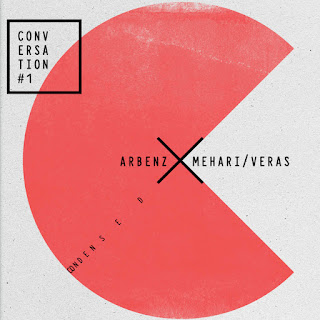By Paul Acquaro
Florian Arbenz – Conversations #1 (2021) ****
About a year ago Swiss drummer and composer Florian Arbenz released the
first of his planned dozen “Conversations” recordings.
Conversations #1 with Brazilian guitarist Nelson Veras and American
trumpeter Hermon Mehari. Arbenz’s CV features tours with Greg Osby &
Dave Liebman, and a duo recording with Osby from a little while back. Veras is a
versatile guitarist with roots in Brazil and experience living and working
in Europe, his own resume mentions work with Osby, Lee Konitz, and Tomasz Stanko, among others. Finally, Mehari is
a music educator and performer, whose experience includes working with Hubert Laws, Randy Brecker, and Tony Tixier.
first of his planned dozen “Conversations” recordings.
Conversations #1 with Brazilian guitarist Nelson Veras and American
trumpeter Hermon Mehari. Arbenz’s CV features tours with Greg Osby &
Dave Liebman, and a duo recording with Osby from a little while back. Veras is a
versatile guitarist with roots in Brazil and experience living and working
in Europe, his own resume mentions work with Osby, Lee Konitz, and Tomasz Stanko, among others. Finally, Mehari is
a music educator and performer, whose experience includes working with Hubert Laws, Randy Brecker, and Tony Tixier.
By looking at the names dropped, you may be tempted to be thinking along
mainstream modern jazz lines, and you would not be wrong. Conversations #1 opens with
‘Boarding the Beast’, a syncopated guitar and drum duet kicks it off introducing a lithe, up-tempo melodic tune. The guitar work is delicate feel but assured, and when Mehari comes
in, he is laser focused and poignant. Veras then takes an extended solo. Embracing fractured
phrases and start and stop melodic ideas, its short but lively life-span is
captivating. Moving to the next one, ‘Let’s Try This Again’, sees Mehari in
the lead, playing a hopeful, though melancholic, melody over Veras’ sweeping
arpeggios. Arbenz is nearly absent aside from a splash of cymbals
or some gentle stick-work below Mehari’s arcing lines, until the track picks
up with a rolling rhythm and a melody that feels instantly
recognizable.
mainstream modern jazz lines, and you would not be wrong. Conversations #1 opens with
‘Boarding the Beast’, a syncopated guitar and drum duet kicks it off introducing a lithe, up-tempo melodic tune. The guitar work is delicate feel but assured, and when Mehari comes
in, he is laser focused and poignant. Veras then takes an extended solo. Embracing fractured
phrases and start and stop melodic ideas, its short but lively life-span is
captivating. Moving to the next one, ‘Let’s Try This Again’, sees Mehari in
the lead, playing a hopeful, though melancholic, melody over Veras’ sweeping
arpeggios. Arbenz is nearly absent aside from a splash of cymbals
or some gentle stick-work below Mehari’s arcing lines, until the track picks
up with a rolling rhythm and a melody that feels instantly
recognizable.
Throughout, the rhythmic connection between the three musicians is a highlight. ‘Groove A’, for example, works with a harmonic and groove (for a
lack of a better word) that lurches alluringly and seems to inspire playful
ideas from the trumpeter. However, now to contradict myself, ‘Vibing with
Morton’ barely has a pulse – which in this case is a good thing – Mehari’s
mournful melody is the backbone of the track, while Arbenz adds restraint
atmospheric percussion. The variety of the tracks is also an alluring aspect
of the recoding, as the pace picks up quickly on the following track.
Overall, a set of nicely composed songs and a nicely sequenced album helps
frame the conversation of these three thoughtful and accomplished musicians.
lack of a better word) that lurches alluringly and seems to inspire playful
ideas from the trumpeter. However, now to contradict myself, ‘Vibing with
Morton’ barely has a pulse – which in this case is a good thing – Mehari’s
mournful melody is the backbone of the track, while Arbenz adds restraint
atmospheric percussion. The variety of the tracks is also an alluring aspect
of the recoding, as the pace picks up quickly on the following track.
Overall, a set of nicely composed songs and a nicely sequenced album helps
frame the conversation of these three thoughtful and accomplished musicians.
Florian Arbenz – Conversations #2 & 3 (2021) ****
Following the strength of the melodically and harmonically rich
Conversations #1, what direction would Arbenz take in the next
release? It seems a focus on rhythm was on his mind as the next
release in the series was a double recording:
Conversations #2 pairs Arbenz with UK based vibraphonist and drummer
Jim Hart, and Conversations #3 adds, in addition, Swiss bassist Heiri Känzig.
Conversations #1, what direction would Arbenz take in the next
release? It seems a focus on rhythm was on his mind as the next
release in the series was a double recording:
Conversations #2 pairs Arbenz with UK based vibraphonist and drummer
Jim Hart, and Conversations #3 adds, in addition, Swiss bassist Heiri Känzig.
The opening track of #2 sets the bar high. ‘Triptych’ begins with a
demonstration of beauty of the vibraphone – ringing, overlapping chordal
fragments sprinkled with sumptuous overtones, it’s a aural delicacy.
However, the vibraphone is a mallet instrument and each tones in imbued with
percussive qualities, which is then delicately amplified by Arbenz’s
drumming. Picking up on Hart’s pulse, Arbenz adds an invigorating element.
‘Wooden Lines’, the next track, is an early show stopper. Hart’s moves to
marimba accentuates the percussiveness of the track and his dry, wooden
melodic notes get pushed along by Arbenz’s straight forward approach.
‘Freedom Jazz Dance,’ the Eddie Harris tune, which also appeared on
Conversations #1, has a deconstructed minimalist arrangement. The version that closed Conversations #1 focused on the melody spread between trumpet and guitar, whereas here the
it is naturally on the rhythmic aspects. The vibraphone takes the tunes
head in a more fragmented way and Arbenz uses a restricted number of
percussive elements quite creatively. It is a neat exercise to place the two
takes next to each other.
demonstration of beauty of the vibraphone – ringing, overlapping chordal
fragments sprinkled with sumptuous overtones, it’s a aural delicacy.
However, the vibraphone is a mallet instrument and each tones in imbued with
percussive qualities, which is then delicately amplified by Arbenz’s
drumming. Picking up on Hart’s pulse, Arbenz adds an invigorating element.
‘Wooden Lines’, the next track, is an early show stopper. Hart’s moves to
marimba accentuates the percussiveness of the track and his dry, wooden
melodic notes get pushed along by Arbenz’s straight forward approach.
‘Freedom Jazz Dance,’ the Eddie Harris tune, which also appeared on
Conversations #1, has a deconstructed minimalist arrangement. The version that closed Conversations #1 focused on the melody spread between trumpet and guitar, whereas here the
it is naturally on the rhythmic aspects. The vibraphone takes the tunes
head in a more fragmented way and Arbenz uses a restricted number of
percussive elements quite creatively. It is a neat exercise to place the two
takes next to each other.
Conversations #3 with Känzig begins with ‘Ramprasad,’ and finds the
bass and vibraphone in duet for the first minute. Arbenz then joins,
underscoring the melody that the two were playing. As the track progresses,
the value of Känzig’s contribution becomes clear, as he adds a bottom end that is not present on the other two recordings. The next track solidifies
this impression, ‘Jammin’ in the Children’s Corner’ starts with an up-tempo introduction that sports occasional intersections between the
vibraphone’s melodic line and the bass’s groove. It is infectiously good. Arbenz
takes a short rollicking solo, followed by an excursion from the vibraphone
that carried along by Känzig. The follow up, ‘Ode to The Sentimental
Knowledge’ is a more serious affair, the ballad begins with an evocative
melody intertwined with a lyrical bass line, and over time, the trio builds confidently to a resonant
peak. The album closes with Thelonious Monk’s elliptical ‘Epistrophy’,
whose rhythmic displacements and hypnotic lead line is a perfect
fit for this group.
bass and vibraphone in duet for the first minute. Arbenz then joins,
underscoring the melody that the two were playing. As the track progresses,
the value of Känzig’s contribution becomes clear, as he adds a bottom end that is not present on the other two recordings. The next track solidifies
this impression, ‘Jammin’ in the Children’s Corner’ starts with an up-tempo introduction that sports occasional intersections between the
vibraphone’s melodic line and the bass’s groove. It is infectiously good. Arbenz
takes a short rollicking solo, followed by an excursion from the vibraphone
that carried along by Känzig. The follow up, ‘Ode to The Sentimental
Knowledge’ is a more serious affair, the ballad begins with an evocative
melody intertwined with a lyrical bass line, and over time, the trio builds confidently to a resonant
peak. The album closes with Thelonious Monk’s elliptical ‘Epistrophy’,
whose rhythmic displacements and hypnotic lead line is a perfect
fit for this group.
Florian Arbenz – Conversations #4 (2021) ****
Conversations #4 is a more ‘traditional’ trio setting – joining
the Arbenz here is Cuban saxophonist Maikel Vistel and French bassist François
Moutin. In one sense, they pick up where the last recording ended, with a take on
a Monk classic, this time it’s ‘Bemsha Swing.’ The treatment is fairly
conventional, but that is not meant to take anything away from it – it
is excellent. Vistel is fierce, his solo is fiery; Arbenz is precise, each
syncopated beat giving the song a special lilt; and Moutin seems to know
exactly how much is needed to give an extra bump of energy without
overpowering.
the Arbenz here is Cuban saxophonist Maikel Vistel and French bassist François
Moutin. In one sense, they pick up where the last recording ended, with a take on
a Monk classic, this time it’s ‘Bemsha Swing.’ The treatment is fairly
conventional, but that is not meant to take anything away from it – it
is excellent. Vistel is fierce, his solo is fiery; Arbenz is precise, each
syncopated beat giving the song a special lilt; and Moutin seems to know
exactly how much is needed to give an extra bump of energy without
overpowering.
The Monk track is not a one-off. The trio also pulls of a fast moving
paced of ‘Hackensack’ featuring Moutin and Arbez tastefully duetting in
an extended introduction and then the bassist with a plucky solo. In addition to originals like ‘Pandemia’, the trio arranges ‘Scarlet Woman’ from Joe Zawinul, ‘Waltz for
Debbie’ by Bill Evans, and again visits ‘Freedom Jazz Dance.’ This time,
the version seems to recall the rock-influenced arrangements that Miles
Davis explored on l967’s Miles Smiles, although Vistel’s energetic and upbeat solo offers a
bit of contrast to that album’s seminal version.
paced of ‘Hackensack’ featuring Moutin and Arbez tastefully duetting in
an extended introduction and then the bassist with a plucky solo. In addition to originals like ‘Pandemia’, the trio arranges ‘Scarlet Woman’ from Joe Zawinul, ‘Waltz for
Debbie’ by Bill Evans, and again visits ‘Freedom Jazz Dance.’ This time,
the version seems to recall the rock-influenced arrangements that Miles
Davis explored on l967’s Miles Smiles, although Vistel’s energetic and upbeat solo offers a
bit of contrast to that album’s seminal version.
So far an excellent exploration of musical partnerships. An obvious question is what will Conversations #5 bring?




